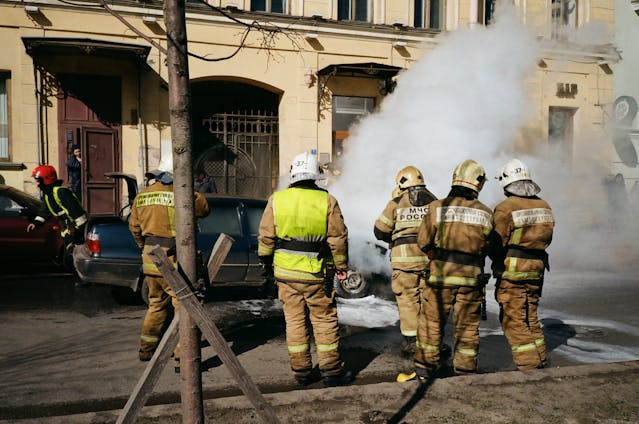Accidents can be life-altering, not just for the person directly involved but for their entire family. The aftermath can be chaotic and filled with emotional turmoil, medical decisions, and financial concerns.
In these critical moments, offering the right support to your family can make a significant difference in their recovery process.
Whether the accident is minor or severe, knowing how to assist your loved ones effectively can help them navigate this challenging time more smoothly.

How to Assist Your Family After an Accident
Providing Emotional Support
Emotional support is one of the most crucial aspects of assisting your family after an accident. The trauma of an accident can leave lasting emotional scars, and your loved ones may be dealing with fear, anxiety, or even depression.
It’s important to create a safe space where they feel comfortable expressing their feelings. Listen actively without judgment, and validate their emotions.
Sometimes, just being there for them, offering a shoulder to cry on, or a listening ear, can be the most significant support you provide.
Encouraging your family members to seek professional counseling or therapy if needed can also be beneficial. Mental health professionals can offer coping strategies and tools to deal with the emotional aftermath of an accident, helping your loved ones process their feelings in a healthy way.
Navigating Medical Decisions
After an accident, medical decisions often come fast and require careful consideration. As a family member, you may be called upon to help make these decisions, especially if the injured person is unable to do so.
Start by gathering all the necessary information from healthcare providers, including treatment options, potential outcomes, and risks.
Don’t hesitate to ask questions or seek second opinions if needed. It’s also important to ensure that the injured person is receiving appropriate care, whether that means advocating for them in the hospital or arranging for specialized care at home.
Being organized and keeping a record of all medical appointments, treatments, and medications can be incredibly helpful in managing the healthcare process.
Remember, your role is to support and empower your loved one in making informed decisions about their health, not to take control unless absolutely necessary.
Seeking Professional Legal Guidance
In the wake of an accident, navigating the legal landscape can be daunting, but enlisting the help of a personal injury attorney can be invaluable.
A seasoned attorney specializes in advocating for the rights of those injured due to someone else’s negligence, ensuring that your family receives the compensation they deserve.
They can handle complex legal procedures, negotiate with insurance companies, and gather the necessary evidence to build a strong case.
This professional guidance allows your family to focus on recovery without the added stress of legal battles. By working closely with a personal injury attorney, you can help secure a more stable future for your loved ones, covering medical expenses, lost wages, and other damages that may arise from the accident.
By taking this step, you ensure that your family’s rights are protected and that they have the best chance of achieving a fair and just outcome.
Ensuring a Smooth Recovery
Recovery from an accident often extends beyond immediate medical treatment, requiring long-term care and rehabilitation. As a family member, coordinating this care is essential to help your loved one regain their strength and independence.
This might involve setting up physical therapy sessions, arranging for home health care, or modifying the home environment to accommodate mobility challenges. Staying in close communication with healthcare providers will help you monitor progress and adjust care plans as needed.
Also, providing encouragement and support during this recovery phase can motivate your family members to stay committed to their rehabilitation goals, ultimately leading to a more successful and complete recovery.
Balancing Responsibilities and Care
An accident can disrupt the normal routine of your household, adding stress to an already challenging situation. Maintaining family stability is really important during this time, ensuring that all family members, including children and elderly relatives, are cared for and supported.
Balancing the responsibilities of caregiving with work, school, and other commitments can be difficult, but creating a structured plan can help. Consider delegating tasks among family members, reaching out to friends for assistance, or hiring professional help for tasks like housekeeping or childcare.
Keeping open lines of communication within the family is also important, allowing everyone to express their concerns and needs.
By fostering a sense of unity and cooperation, you can help your family navigate this difficult period together, ensuring that everyone’s well-being is maintained.

Keeping Everyone Informed
Clear and consistent communication is key to managing the aftermath of an accident, especially when multiple parties are involved, such as healthcare providers, insurance companies, legal representatives, and family members.
Keeping everyone informed helps ensure that all aspects of care and recovery are aligned and that there are no misunderstandings or gaps in the process.
Regularly updating family members on the injured person’s condition, treatment plans, and legal proceedings fosters transparency and trust.
Also, maintaining open lines of communication with your attorney, medical professionals, and insurance representatives helps to streamline decision-making and prevent delays in the recovery process.
By staying organized and proactive in your communication efforts, you can help ensure that all necessary steps are taken promptly and that everyone involved is working towards the same goal: the best possible outcome for your loved one.
Assisting your family after an accident is a significant responsibility that touches on multiple aspects of their lives, from emotional well-being to physical recovery and financial security.
The journey to recovery can be long and complex, but your active involvement can make a profound difference. By providing unwavering emotional support, you help your loved ones navigate the psychological challenges that often accompany trauma.
Your role in making informed medical decisions ensures that they receive the best possible care, while managing financial and legal responsibilities with the help of a personal injury attorney safeguards their future.
Also, coordinating rehabilitation efforts and maintaining family stability creates an environment where healing is prioritized, and disruptions are minimized.
Through your compassionate and diligent efforts, you not only assist your family in overcoming the immediate aftermath of the accident but also empower them to rebuild their lives with resilience and confidence.
In these moments of crisis, your support becomes the cornerstone of their recovery, guiding them through adversity and helping them find strength in the face of challenges.